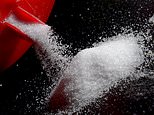Salt substitute `could prevent thousands of strokes and heart attacks’, research suggests
Salt substitute ‘could prevent thousands of strokes and heart attacks’, research suggests
Participants got substitute three-quarters salt and a quarter potassium chlorideMore than 20,000 people in rural China took part in the study, researchers saidThey all had a history of strokes or were over 60 with high blood pressure
<!–
<!–
<!–<!–
<!–
(function (src, d, tag){
var s = d.createElement(tag), prev = d.getElementsByTagName(tag)[0];
s.src = src;
prev.parentNode.insertBefore(s, prev);
}(“https://www.dailymail.co.uk/static/gunther/1.17.0/async_bundle–.js”, document, “script”));
<!–
DM.loadCSS(“https://www.dailymail.co.uk/static/gunther/gunther-2159/video_bundle–.css”);
<!–
A salt substitute could prevent thousands of strokes and heart attacks a year, research suggests.
More than 20,000 people took part in the study who had previously suffered a stroke or were over 60 and had high blood pressure.
They were given the supplement — containing salt and potassium — for five years.
Scientists found it cut the risk of a stroke by 14 per cent compared to those who ate normal salt, and of a heart attack by 13 per cent.
Salt supplements containing potassium are already available on UK supermarket shelves and in China, where the study took place, costing around £1.22 per kg compared to 78p for normal salt.
The supplements, which taste like normal salt, have previously been linked to lower blood pressure. But the research is the first to associate them to a reduced risk of strokes and heart attacks.
Around 34,000 people suffer a stroke every year in the UK, while in the US almost 800,000 people have a stroke annually. Hospitals receive more than 100,000 heart attack patients a year in Britain, while in the US there are more than a million.
New research suggests thousands of strokes and heart attacks could be prevented annually in the UK if diners were to replace salt with a common substitute (Anthony Devlin/PA)
The study involved more than 20,000 people living in villages across rural China, who were given either salt or a salt substitute for five years.
The substitute was three quarters salt and a quarter potassium chloride, a compound that is already used to treat low potassium levels in the blood.
Potassium is lacking in many people’s diets, with 17 per cent of UK adults thought to be taking in too little.
It is needed for healthy muscles and nerves — and for normal blood pressure.
Studies show low potassium levels, or hypokalemia, can lead to an irregular heartbeat and problems in the kidneys.
Results showed there were 29.14 strokes per 1,000 person-years among those who ate the supplement, compared to 33.65 for those who got normal salt.
For heart attacks there were 49.09 per 1,000 person-years among those who got the supplements, and 56.29 for those who got normal salt.
The study’s authors concluded: ‘Among persons who had a history of stroke or were 60 years of age or older and had high blood pressure, the rates of stroke, major cardiovascular events, and death from any cause were lower with the salt substitute than with regular salt.’
Professor Bruce Neal, from the George Institute for Global Health in Sydney and who led the study, told The Times: ‘If you were to replace all of the salt on the supermarket shelves [in the UK] with salt substitutes you would prevent thousands of strokes and heart attacks every year — that’s quite safe to say.’
The study was published in the New England Journal of Medicine.
It would be expected to yield different results in the UK because British people eat more processed food that already contains high levels of salt.
Chinese villagers, on the other hand, normally cook from scratch meaning they have to add salt.
Professor Graham MacGregor, a cardiovascular medicine specialist at Barts hospital who was not involved in the research, told the newspaper: ‘This very important study clearly demonstrates that [in the UK] consumers should be encouraged not to add salt to food, but if they have to, it’s vital that they use a reduced sodium with added potassium salt.’
He added: ‘The food industry can reduce the huge amounts of salt they add to food, and safely replace it where necessary with potassium salt.’
![]()


